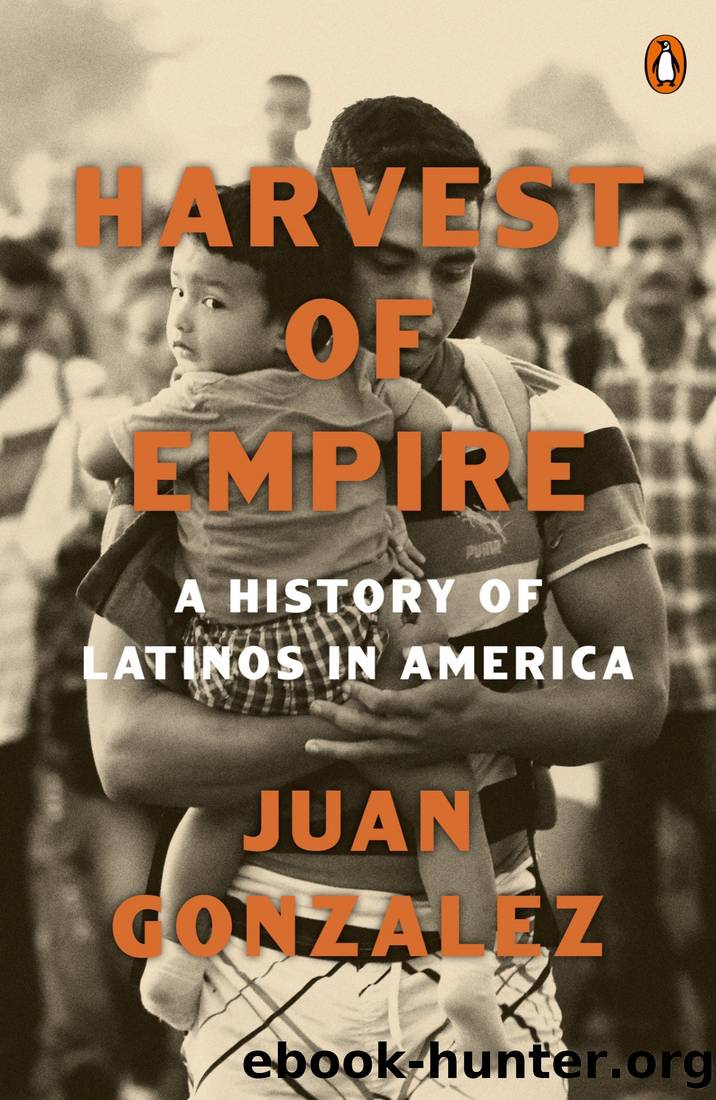Harvest of Empire: A History of Latinos in America: Second Revised and Updated Edition by Juan Gonzalez

Author:Juan Gonzalez [Gonzalez, Juan]
Language: eng
Format: epub
ISBN: 9780593511473
Google: _CdiEAAAQBAJ
Published: 2022-06-14T02:37:56.969076+00:00
U.S. LATINO CULTUREâNOTES ON AN UNTOLD STORY
Latino literary heritage in this country dates back to 1610, when Gaspar Pérez de Villagrá penned the first epic poem in U.S. history, Historia de la Nueva México. A Mexican-born criollo, Pérez de Villagrá accompanied the expedition of conquistador Juan de Oñate, who colonized New Mexico and stamped out the resistance of the Pueblo Indians in 1599. The poem, written fourteen years before Captain John Smithâs General History of Virginia, is an account of that expedition and of the conquest of the Pueblos of Acoma.[30] A Spanish court subsequently convicted Oñate of atrocities against the natives and banished him from New Mexico, thus removing him from the pantheon of the conquistadores of his age.[31]
Pérez de Villagráâs epic, however, survived as a definitive narrative of that conflict. It is written in the classical canto style of Spainâs Golden Age, using hendecasyllabic verse (metrical lines of eleven syllables each), and while much of it gets bogged down in a mundane recounting of events, occasional passages rival in their vividness those found in the Iliad or Paradise Lost. Yet few American-literature students have even heard of the poem.
Some of that is understandable, given that Pérez de Villagrá wrote in Spanish, and this epic dates back four hundred years, but the same cannot be said of Felix Varelaâs work less than two hundred years ago. Perhaps no single Latino left a greater imprint on nineteenth-century American culture than Varela, the father of the Catholic press in the United States. A Cuban-born priest, philosophy professor, and revolutionary, Varela fled to the United States in 1823 to avoid arrest by the Spanish Crown and settled in Philadelphia. There he published Cubaâs first pro-independence journal, El Habanero, and dedicated himself to translating important English works into Spanish, including Thomas Jeffersonâs Manual of Parliamentary Practice and Sir Humphry Davyâs Elements of Agricultural Chemistry.
He was eventually appointed pastor of his own church in New York City, where he garnered a legendary reputation for his work among New Yorkâs Irish immigrants, creating dozens of schools and social service organizations for the cityâs poor and even founding the New York Catholic Temperance Association in 1840, and where he rose to become vicar-general of the New York Archdiocese. But it was in the realms of theology and literature that Varela left his most important legacy. Among the pioneering publications he edited and helped to found were The Protestantâs Abridger and Annotator (1830), the countryâs first ecclesiastical review; the weekly Catholic Observer (1836â1939); and the first two literary and theological Catholic journals, The Catholic Expositor and Literary Magazine (1841â1843) and the Catholic Expositor (1843â1844). Even as he juggled his amazing workload, Varela found time to inspire and mentor a generation of patriots back in his homeland, where he is still revered as the greatest Cuban thinker of his time. He died in 1853 in Saint Augustine, Florida, without ever getting to see his Cuba free of Spanish rule.[32]
The mexicanos living in the annexed territories of the Southwest
Download
This site does not store any files on its server. We only index and link to content provided by other sites. Please contact the content providers to delete copyright contents if any and email us, we'll remove relevant links or contents immediately.
Cecilia; Or, Memoirs of an Heiress — Volume 1 by Fanny Burney(32559)
The Great Music City by Andrea Baker(32021)
Cecilia; Or, Memoirs of an Heiress — Volume 2 by Fanny Burney(31957)
Cecilia; Or, Memoirs of an Heiress — Volume 3 by Fanny Burney(31943)
We're Going to Need More Wine by Gabrielle Union(19050)
All the Missing Girls by Megan Miranda(16036)
Pimp by Iceberg Slim(14515)
For the Love of Europe by Rick Steves(14147)
Bombshells: Glamour Girls of a Lifetime by Sullivan Steve(14078)
Talking to Strangers by Malcolm Gladwell(13375)
Norse Mythology by Gaiman Neil(13372)
Fifty Shades Freed by E L James(13245)
Mindhunter: Inside the FBI's Elite Serial Crime Unit by John E. Douglas & Mark Olshaker(9345)
Crazy Rich Asians by Kevin Kwan(9295)
The Lost Art of Listening by Michael P. Nichols(7507)
Enlightenment Now: The Case for Reason, Science, Humanism, and Progress by Steven Pinker(7315)
The Four Agreements by Don Miguel Ruiz(6767)
Bad Blood by John Carreyrou(6624)
Weapons of Math Destruction by Cathy O'Neil(6282)
